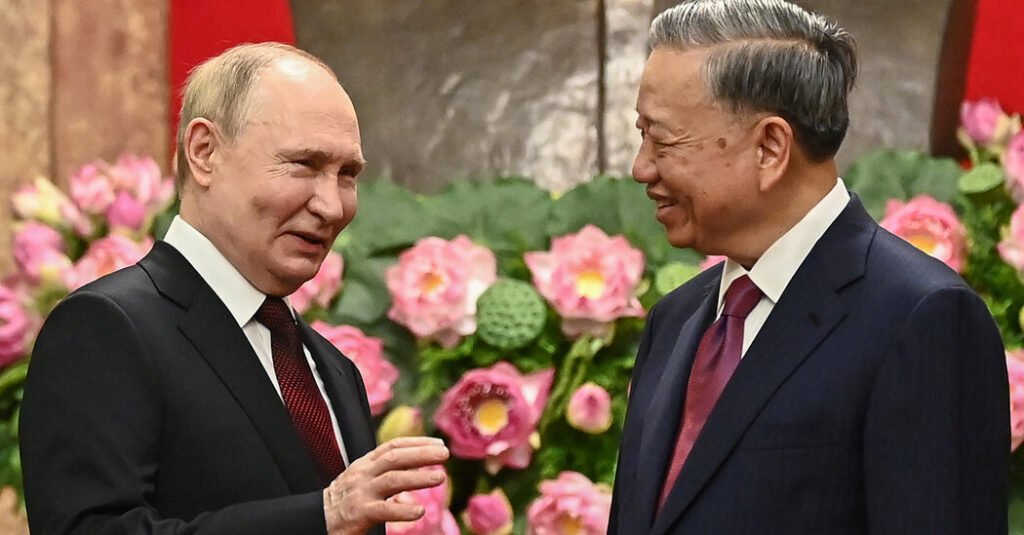President Vladimir V. Putin’s state visit to North Korea appeared to focus solely on military issues — the two countries dramatically revived a Cold War-era mutual defense pact — a day after the Russian leader was far less provocative in Vietnam.
Vietnam values its relationship with the United States and any harsh words from Putin about the U.S. in Vietnam would jeopardize those ties. So despite Vietnam and Russia having deep military ties and a shared communist history, leaders in Hanoi focused their talks with Putin on strengthening ties in areas such as trade, education, energy and science and technology. The Russian leader refrained from making any public comments.
While no major breakthroughs were made, the show of solidarity with Vietnam was intended to give Putin a semblance of international legitimacy at a time of increasing isolation in the West.
Three key takeaways from his visit were:
It was a kind of diplomatic show for Putin.
Unlike North Korea, which is shunned by the West, Vietnam has been viewed favorably by the United States as it seeks to contain China’s growing global influence. In the past year alone, Hanoi has hosted President Biden and China’s top leader, Xi Jinping.
Putin’s visit to Vietnam is part of the Russian leader’s efforts to show he remains accepted by world leaders despite Western efforts to isolate him over the invasion of Ukraine, a point underscored by visits late last year to the United Arab Emirates and Saudi Arabia, key U.S. partners in the Middle East.
Mr Putin was greeted by a 21-gun salute at the Imperial Citadel of Thang Long, a key historic site in the centre of the capital. As Mr Putin’s motorcade passed, Vietnamese schoolchildren lined the streets of Hanoi, following the usual script, waving Russian and Vietnamese flags. This is Mr Putin’s fifth visit to the country since 2001, but his first since the country’s all-out invasion of Ukraine.
Vietnam and Russia share a long history bound by ideology. In 1950, the Soviet Union was one of the first countries to grant diplomatic recognition to the then Democratic Republic of Vietnam, also known as North Vietnam.
According to Vietnam’s Tuoi Tre newspaper, Nguyen Phu Trong, a powerful leader of Vietnam’s Communist Party, told Putin that as someone who lived and studied in Russia, he still “remembers this great and beautiful country of Russia with warm feelings and nostalgia.”
Moscow was Vietnam’s largest donor for decades, providing military aid when the country was at war with France and the United States — a fact Putin was at pains to remind Vietnamese people on Thursday.
“The Soviet Union, as you pointed out, provided effective support to the heroic struggle of the Vietnamese people against the French and then American invaders and subsequently contributed to the peaceful construction of the Socialist Republic of Vietnam,” Putin said, flanked by Vietnamese Prime Minister Pham Minh Chinh.
Vietnam has stopped short of expressing support for Russia’s war in Ukraine, but has been careful not to sour relations with Moscow.
Last weekend, Hanoi skipped the Ukraine peace summit in Switzerland, abstained on four UN resolutions condemning Russia’s attacks on Ukraine, and voted against a motion to remove Russia from the UN Human Rights Council.
Putin’s remarks were met with silence in Hanoi.
Unlike his meeting with North Korean leader Kim Jong Un the previous day, Putin refrained from making any harsh criticism of the United States in public.
Sitting across from Kim Jong Un on Wednesday, the former president blasted the United States as a hegemonic, imperialist power trying to impose its will on the world through its satellite states. Kim signed a defense pact pledging to support North Korea in the event of war and teased greater cooperation with Kim’s military.
In Vietnam, the Russian leader continued to make uncontroversial remarks about trade and historical ties, a message that appeared to be tailored with his Vietnamese counterpart in mind.
Vietnam, which strengthened ties with the United States last year, has been cautious about how it feels about Putin’s visit. Ahead of the trip, officials in Washington made clear they were not pleased with the visit, saying “no country should give Putin a platform to pursue a war of aggression and normalize atrocities.”
Vietnamese media highlighted the visit as focusing on bilateral ties and the two countries’ long historical past as Cold War-era friends.
“Whatever Russia offers, I don’t think Vietnam will jump on it and give the impression or the impression that it is aligning with Russia on an anti-Western front,” said Hoang Thi Ha, a senior research fellow at the ISEAS Yusof Ishak Institute in Singapore.
Russia has long supplied arms to Vietnam, but little has been said publicly about arms procurement or defense. President Putin’s new defense minister, Andrei R. Belousov, accompanied the Russian leader to North Korea but then appeared to cancel the visit, and the Russian Defense Ministry on Thursday released photos of him inspecting a military medical facility on Russian soil.
For Vietnam, it was a display of “bamboo diplomacy.”
Hanoi says it has the highest bilateral ties with seven countries – Russia, China, the United States, India, South Korea and Australia – and maintaining ties with one of them would help balance out its relations with the others.
Both Russia and Vietnam stand to gain significantly from Vietnam’s development of oil and gas resources in the South China Sea, and President Putin has pledged to provide long-term supplies of oil and gas products to Vietnam.
Huong Le Thu, deputy Asia director at the International Crisis Group, said Putin’s visit demonstrated Vietnam’s ability “to maintain relations with all parties despite great power rivalry and competition.”
Chung calls this approach “bamboo diplomacy,” saying the flexibility of the bamboo branches allows South Korea to balance multiple relationships with major powers.
“This is something that puts Hanoi’s interests at the centre, not anyone else’s interests,” Phuong said.

